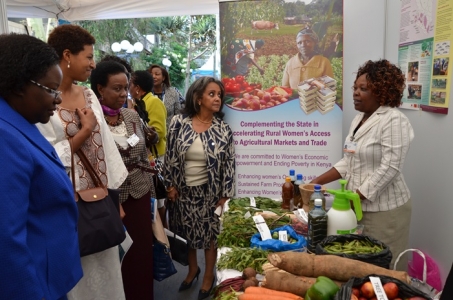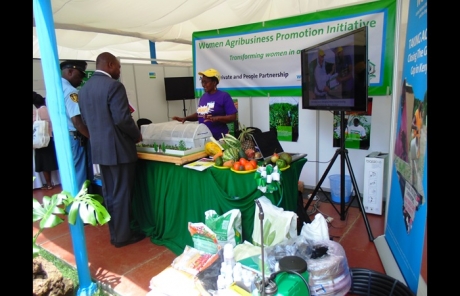Women all over the world and particularly in Africa are known to be responsible for producing, selecting and utilizing food, family nutrition and food security. Nonetheless, the world has yet to realize that the resources needed for full participation of women in the rural economy is not in the hands of these women who contribute most to it sustainability and development.
The Sharefair event brought together rural women innovators to interact with the academia, youth, private sector, research institute and organization, policy makers at the national, regional and international level. It offered a platform for policy makers to have high level dialogue to accommodate the needs and aspirations of women, highlights gender sensitive agriculture and nutrition policies; About 100 exhibitors from 14 countries were present.
Coinciding with the International Day of Rural Women as well as the International Year of Family Farming and the year of Agriculture and Food and Nutrition Security, the Sharefair aimed at identifying innovators/exhibitors targeting transformational women farmers and agro-entrepreneurs in the Eastern and Southern Africa region to bring together suitable agricultural technologies that are used by and appropriate to the context of rural women smallholder farmers and/or to cost-effectively address women’s ‘time poverty’ and linked to women’s responsibility for unpaid household chores or other labor-intensive activities.
 Photo-Christian Mulumba/ UN Women via Flickr.
Photo-Christian Mulumba/ UN Women via Flickr.
Women are most of the time left out of thinking and talking about farmers. These same women however, contribute to not only family and community food production but also to national food security and development. Family farms provide up to 80 per cent of the food supply in Africa and many of those working on these farms are women. The necessary resources that would ensure food and nutritional security for all families, communities and countries are vast yet giving women agricultural technologies and innovations would not only accelerate growth and production, reduce poverty and ensure food security but will at the same time reduce the burden and time spent on both on and off-farm activities and create avenues and time for other livelihood activities.
Why are agricultural technologies and innovations important to rural livelihood development and food/nutrition security?
The 2014 Sharefair showed that women are real-time agricultural innovators and technology transformers. The event showcased different agricultural technologies that are part of a wave of technological transformation in the continent, from mobile technologies that easily connect markets to agricultural products, to identifying agricultural value chains, post-harvest service technologies, climate smart agricultural technologies, organic farming, clean and energy saving stoves, etc.
Who is and should be involved in this transformation?
It is essentially a South-South initiative that could being together rural women innovators from around the world, and offer a platform for policymakers, academics, research institutions, food producers, investors, technology innovators and others to interact. The launch of the 2014 Sharefair is inspiring and helps to showcase agricultural production and value addition innovations, and to identify new means of scaling up existing technologies by connecting farmers to entrepreneurs, investors and policy makers. Numerous small-scale innovations are being employed in the Eastern and Southern Africa region that need to be shared, incubated and taken to scale.
 Photo- Jack Abebe/ UN Women- Knowledge Gateway via Flickr.
Photo- Jack Abebe/ UN Women- Knowledge Gateway via Flickr.
To draw attention to the critical role women play in all aspect of agriculture, and why agricultural technologies and innovations are important to rural livelihood development and food/nutrition security, presenters from the UN, African Union, the Kenyan Government, International Development Research Centre, and FAO highlighted the following main points:
- Generation of technology options and innovations that meet the needs of women farmers and that can serve the sector and the region will be a lasting contribution to food secured Africa;
- Women’s efforts are the bedrock of food production and nutrition, and they have been hampered by lack of technologies and discriminatory practices that consistently widens the gender gap in access agricultural inputs, technological development and land and tenure rights;
- Access to agricultural technologies and innovations will provide women the time for leisure and rest required for a long productive and healthy life.
- Innovative technologies once suitable for women smallholder farmers using locally available inputs, ecologically friendly and socially sustainable, would spark accelerated growth, reduce poverty and develop national economies;
- Accelerated programmatic and policy attention to gender, agriculture and practical ways to overcome current gender-related technology, food security, and nutritional challenges;
- Innovation in a place can inspire replication everywhere; women are known to network effectively, embrace change and ensure it sustainability.
This blog was written by Jummai Yila. Jummai is a Programme Officer at the African Forest Forum (AFF), Nairobi Kenya and she has researched gender, livelihoods, climate change adaptation, and natural resource management in many countries of Africa and Southeast Asia.
This is a blog from day 1 of the Sharefair on Rural Women’s Technologies – Inspiring Agricultural Change: Improve Food Security, Nutrition, and Productive Family Farming in Eastern and Southern Africa”. 15 – 17 October, 2014, Nairobi Kenya.